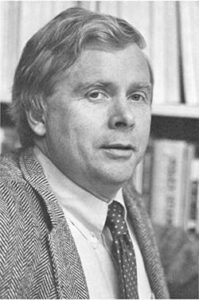
Many people have already done obits and reminiscences of Robert Tollison, a 73-year-old economist who died in his sleep on Monday. My two favorite are Pete Boettke’s and this one at the Liberty Mortuary in Liberty, South Carolina.
Most of them talk about his work in academia. My experience of Bob was very different. I was a summer intern at the Council of Economic Advisers in 1973. When I think of that time, I call it Watergate summer because that’s when the Watergate hearings were going and getting very serious. My boss was Bob Tollison.
Here are some edited excerpts from my book The Joy of Freedom: An Economist’s Odyssey. They’re from a chapter titled “A Tour of Washington.”
Bob Tollison Helps Me Avoid Being Involved with Price Controls
I wondered what the economists at the prestigious Council of Economic Advisers would think of the price controls their big boss had imposed. This wasn’t idle curiosity. I had taken the job to get a feel for government economic policy, but I didn’t want to be a part of any attempt to support the price controls. So, that first day, I wandered up and down the third floor of the OEOB [Old Executive Office Building] looking at names of economists on doors. I searched my memory for any associations, negative or positive, with the names I saw. One name stood out: Robert Tollison. I had seen his name on a number of articles in “Public Choice,” a literature in economics spawned by James Buchanan and Gordon Tullock, that began with the assumption that government officials, just like other people, act mainly on the basis of self-interest. I knocked on his door and found a 29-year-old, friendly guy with whom I had instant rapport. After a half-hour conversation, I thought I could level with him at least somewhat, and so I told him that I thought government price controls were a travesty. When I realized that he supported my views–he was worried that the coming price controls on food would cause some people to go without food–I went further and told him that I thought the government’s price-control policy was incredibly immoral and that I didn’t want to have any part in it. He told me that he felt the same way and that it was possible to do good work at the Council and not be involved in price controls. When I asked him what issues he was working on, he named some interesting ones and some less interesting ones, none of which involved price controls. I asked if I could work with him, and he said he’d see what he could do.
The next morning, when I showed up at work, Joel Popkin, a senior economist at the Council, gave me a table of numbers that gave the weights on the various foods in the bundle of items that is priced to get the Consumer Price Index. He wanted me to add the weights to see what percent of the CPI was accounted for by food. Not exactly a tough assignment, right? Someone with even moderate fifth-grade math skills could have done it, and I had been a math major. You’d think I could handle it. You’d think wrong.
I just knew in my gut what Popkin would do with those numbers. The Nixon administration was about to come out with the next phase of price controls, and some factions were pushing for tough controls on food prices. I went away to add the numbers and came back to Popkin a few minutes later with my sum. He said that my sum couldn’t be right, and he gave me a reason that made sense. So I went away and added again and came back with a different number. Popkin angrily rejected my second addition, pointing out that it, too, couldn’t be right. Again, he was right. I can’t think of any other time in my life when I’ve done such a poor job of adding. I think that I just hated price controls so much that they got in the way of my ability to do simple arithmetic. I know that, to some people, this may seem like a failing in me as an analyst, and that’s probably true, but I also think it makes me a more successful human.
Later that day, when I told Tollison, somewhat shamefacedly, that I hadn’t been able to add a column of numbers correctly, he chuckled and predicted that Popkin would never call on me again the whole summer. Tollison was right.
The Missing Steak
Many other economists at the Council of Economic Advisers thought price controls were a bad policy that would cause shortages. But–and this was my big disappointment–some of them defended price controls anyway. Council chairman Herb Stein, an excellent economist and one of the nicest and best bosses I have ever had, pushed for tough price controls on food and publicly defended them. In return, he got to spend a weekend at the presidential retreat at Camp David. Later that summer, Tollison and I got a good laugh when Herb came back from the White House mess complaining that they didn’t have steak that day because the supplier wouldn’t supply it at the controlled price. But none of what Herb knew caused him to refuse to cooperate with Nixon on price controls.
And finally, one of the things I most appreciated Bob for:
Bob’s Boost to My Short-Term Career
When Tollison left in early July, he persuaded Herb to let me take his place as a senior economist, without the title, until his replacement arrived in late August.
During the 4 to 6 weeks between when Bob left and his replacement came, he and I spoke on the phone a few times a week. He was always helpful and always had a sense of humor about things.
Bob Tollison was the best boss I ever had.

Comments are closed.